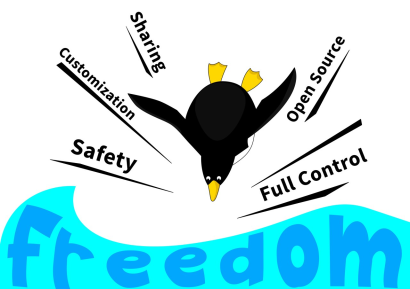- cross-posted to:
- [email protected]
- [email protected]
- cross-posted to:
- [email protected]
- [email protected]
The European Commission sees open-source software as more than an IT tool. Policy makers are encouraging open-source ecosystems to drive innovation, autonomy and collaboration in a world where global trade is being redrawn.
This trade dispute highlights something most open-source advocates have known for years: open source is freedom. It’s freedom from monopolies, freedom from arbitrary pricing, and freedom from foreign influence.



You’re not a tech person, you’re an ideologue, so you wouldn’t understand the culture around ISC. If a company wants security, constancy, and longecity, BSD is the only thing to use.
Choosing between Windows and BSD, which would you prefer everybody use? There are companies that already banned GPL software from company computers, what should they use?
Look, im not even going to respond the first part. I love the bsd’s as well, from a technical standpoint. From a licensing standpoint, not so much (i see the value in a short license, though).
Im not concerned by what these companies use or do not use. Im concerned about protecting my, and other ‘common good’ software with a license that strictly prohibits user exploatation. The GPL does this perfectly.
GPL is evil. GPL is poison. You’re an ideologie. You are vapid of the original UNIX cultural mindset. It’s all mushy feelings you care about, not best tools to accomplish the work. You have no experience how to setup a BSD desktop. If you had a job as network gateway admin for employee network services, your argument would sound very different. You might as well as well say GPL fills my heart with so much love, I wish I could make passionate love to the GPL"
🤣 Do you hear yourself? No one’s going to say something as hyperbolic and emotional as “GPL is evil. GPL is poison.” except an anti-GPL ideologue. The “original UNIX cultural mindset” is itself an ideology. You are an ideologue. You might as well as well say, “BSD license fills my heart with so much love, I wish I could make passionate love to the BSD license.”
My brother in christ, unix was all rights reserved. There was a non-compete agreement prohibiting at&t from selling their OS, hence why it was more or less given to universities. Later, the BSD’s did a theseus ship, and at&t still tried to claim ownership through legal methods. For them, the license symbolizes this independence from at&t, which is why it doesnt lay claims on user protection.
Saving this as a copypasta.
Go lick the boot more. There’s more to the world than some fucking computers. Go download yourself some grass and
touchit.I will in fact, fuck the GPL, I will make sweet passionate love to GNU GENERAL PUBLIC LICENSE Version 3, 29 June 2007 Copyright © 2007 Free Software Foundation, Inc. https://fsf.org/.
https://m.slashdot.org/story/336593
https://www.hardenedbsd.org/~shawn/DEFCON-25-Ilja-van-Sprundel-BSD-Kern-Vulns.pdf
I doubt it changed much and it sounds logical too.
I don’t know what you are saying. Can I assume that you have never touched BSD, know nothing about how it functions?